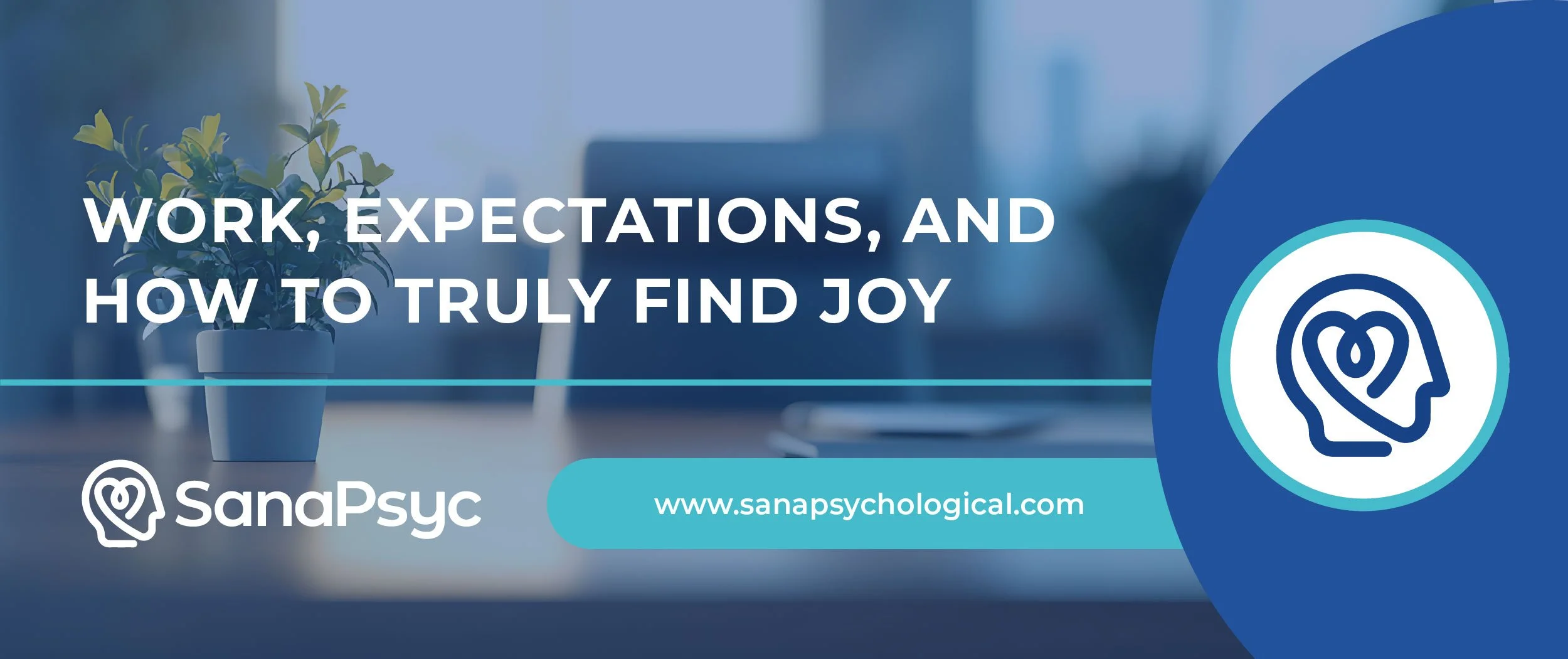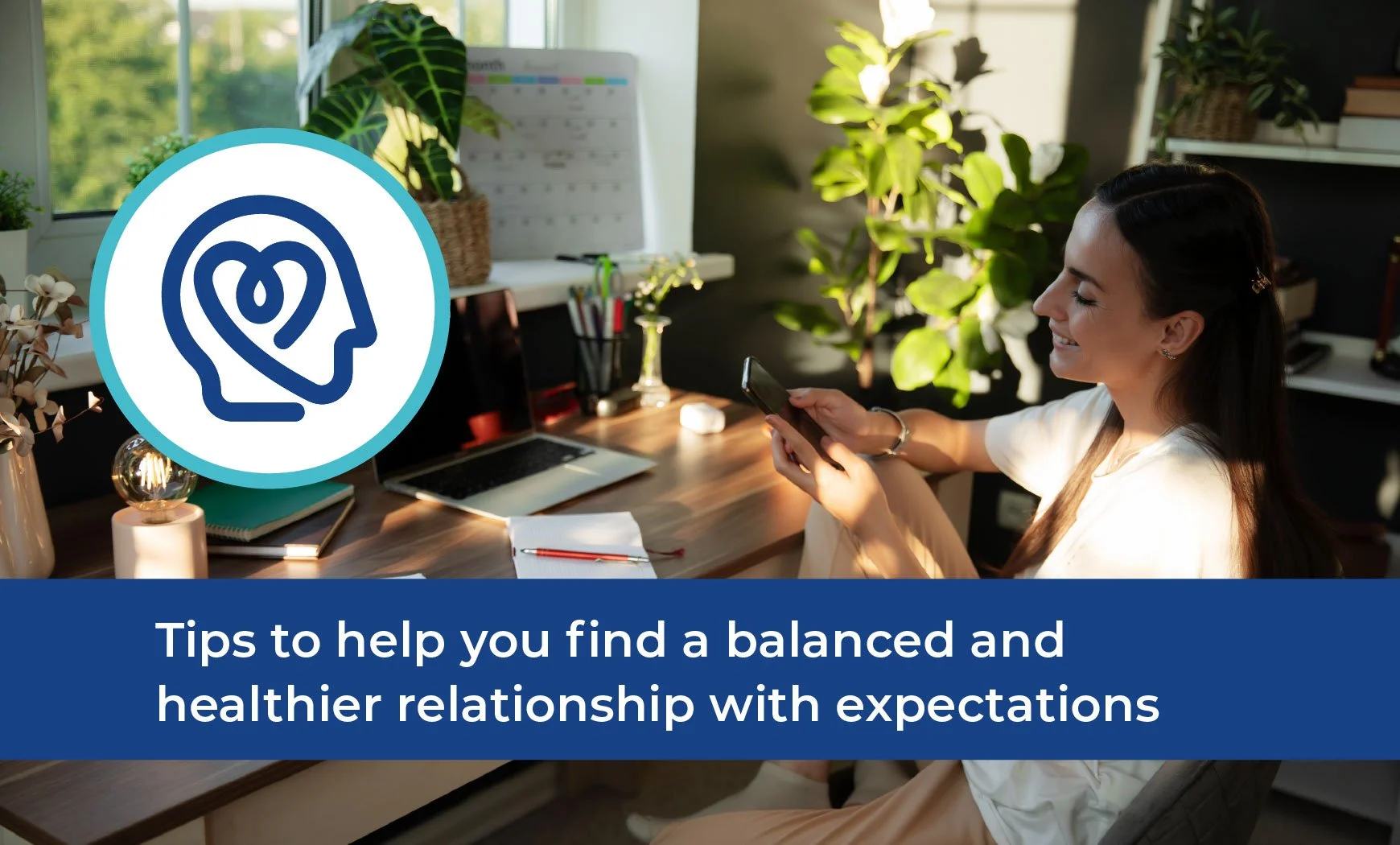Is The Joy Of Work Realistic? Thoughts from Depression Counselling Calgary Therapists
A theme that’s been coming up in the counselling offices recently with our clients has been around work and, specifically, the quest to find joy in one’s work. Now, I’m not saying that this is not an important consideration when considering the role of work in our lives, but I have observed that our expectations and what we are hoping for may be venturing into unrealistic territory.
Can work always be enjoyable? Is work the main area where we need to find joy and fulfillment? Can that happen for everyone? Are we being fed unrealistic narratives from online sources (including from my own community of therapists) about the role of work in our lives?
I am certainly not proclaiming to have all of the answers here, but thought I would open up some thoughts and discussion around this topic, which I hope you will do for yourself. Myself and my team of depression counselling Calgary therapists weigh in and share some thoughts around work, expectations, and how to truly find joy.
The Role of Work in Our Lives: Thoughts from Depression Counselling Calgary Therapists
In Canada, as of June 2025, almost 7% of Canadians were unemployed and not working (Stats Canada). This means that almost 3 million people who need to (and may want to be) working, aren’t. I bring this forward to introduce the question of need vs. want with work- are these people who aren’t working holding out and waiting for work that brings them joy and fulfillment? I’m sure that is the case for some of them but, for others, they want to work to pay their bills, fulfill their basic needs and take care of themselves and their families. This may shift their perception of work and what’s most important.
Emotional Fulfillment At Work: Thoughts from Depression Counselling Calgary Therapists
Is work intended to fulfill us emotionally or is it there to support us logistically? It seems that many people are questing for both, but perhaps to an extreme.
Is it realistic to envision work fulfilling us consistently emotionally and providing all of our logistical needs? Are there not a lot of people out there doing work that is not very emotionally gratifying but it is logistically helpful, and vice versa?
Our depression counselling Calgary therapists help people explore their needs, values, and priorities to get a clearer sense of what matters most because this can help clarify our actions and choices. If you are interested in exploring this for yourself, here is a list of core values to help get you started.
Our depression counselling Calgary therapists have observed that often people feel dissatisfied when they are making unrealistic comparisons and, perhaps, people are comparing upward to those who they see (and think) are living their best professional lives rather than considering the lives and experiences of those who want to work but can’t. Does this shift our perspective? Perhaps.
Expectations and How They Can Help Us from Depression Counselling Calgary Therapists
Expectations are a natural part of being human. We form them about everything—our relationships, careers, health, and even how our day should unfold. At their best, expectations can inspire us, give us direction, and help us set goals. But when left unchecked, expectations can lead to disappointment, frustration, and emotional burnout as our depression counselling Calgary therapists see everyday.
Expectations are beliefs or assumptions about how things should happen in the future. They can be conscious (e.g., “I expect to get promoted this year”) or unconscious (e.g., expecting a friend to text back immediately without realizing it).
They’re shaped by:
Personal experiences
Cultural or societal norms
Upbringing and values
Media and social influence
But here’s the key: Expectations are not reality. They're mental projections—ideas we’ve created in our minds. While they can be helpful, they’re not always accurate or fair.
When approached mindfully, expectations can be powerful tools that help us in the following ways:
1. Motivation and Goal-Setting
Expecting success can increase confidence and drive. Athletes, entrepreneurs, and creatives often thrive by holding high expectations of themselves—it pushes them to work harder and aim higher.
2. Clarifying Desires
Expectations can help us define what we truly want. If you expect a certain level of respect in a relationship, it likely reflects a core value you hold. This can guide healthier boundaries and choices which is work our depression counselling Calgary therapists do with people everyday. Learn more about healthy boundaries in one of our other blog posts.
3. Strengthening Accountability
When we expect others to follow through—or expect ourselves to meet a commitment—it can reinforce responsibility and integrity, especially when communicated clearly.
Expectations and How They Can Help Us from Depression Counselling Calgary Therapists
On the flip side, unrealistic or rigid expectations (which expectations often become) can cause a lot of suffering. Our depression counselling Calgary therapists have observed that expectations can lead to:
1. Disappointment and Resentment
When reality doesn’t meet our expectations, we often feel let down—even if the outcome wasn’t objectively bad. This creates emotional friction, especially in relationships.
Example: Expecting a partner to read your mind or react the way you would can lead to silent resentment.
2. Anxiety and Perfectionism
High expectations, especially self-imposed ones, can fuel anxiety and perfectionism. You might feel like you're never doing enough, even when you're already doing too much. Our depression counselling Calgary therapists observe how this can further lower mood, motivation, and outlook.
3. Missed Joy in the Present
When you’re focused on how things should be, you miss what is. Expectations pull you into the future (or comparisons), often making the present moment feel inadequate. Our depression counselling Calgary therapists have observed that social media can be a key trigger of this external comparison for people and that having more boundaries, including being thoughtful about how often and when you’re online, as well as what type of content and accounts you follow can help reduce unrealistic (and unfair) expectations.
Reducing Expectations from Depression Counselling Calgary Therapists
Here are a few strategies to help you find a balanced and healthier relationship with expectations from our depression counselling Calgary therapists:
✅ Shift from Expectations to Intentions
Instead of expecting things to go a certain way, intend to act with purpose. Intentions are rooted in values, while expectations are tied to outcomes.
✅ Communicate Clearly
Don’t assume others know your expectations—especially in relationships. Speak them kindly and invite dialogue.
✅ Practice Flexibility
Allow space for things to unfold differently than you imagined. Flexibility builds resilience and lowers emotional reactivity. As our depression counselling Calgary therapists remind the people they work with everyday, focus on the process rather than the outcome.
✅ Be Aware of Hidden Expectations
Often, our biggest frustrations come from unconscious expectations. Pause and ask: “What was I expecting here—and is it realistic?”
✅ Appreciate What Is
Gratitude for the present moment is the antidote to expectation-driven disappointment. Notice what’s working, even if it’s not perfect. If you are interested in a gratitude practice, our depression counselling Calgary therapists recommend taking time each morning to list (whether reflectively, out loud or in writing) 3 things that happened within the last 24 hours that you were grateful for. Try to avoid focusing on gratitude for general things like your home, family, etc. Not that you’re not grateful for these things, but the specificity helps keep the gratitude practice more relevant and engaging for our brain and it is more likely to become a consistent habit when practiced this way. If you are interested in journaling, here are some gratitude journal prompts.
Nurturing Joy from Depression Counselling Calgary Therapists
Joy isn’t just a spontaneous burst of happiness—it’s a state of being that can be nurtured and cultivated over time. While happiness often depends on external circumstances, joy comes from within. It’s rooted in presence, gratitude, connection, and meaning. These are the experiences that people will often work on when engaging in depression counselling Calgary. This also means that joy can manifest when we are doing external things, like work, but may not necessarily come from these experiences. What if we could feel a sense of joy no matter where we were or what we were doing?
In a fast-paced world filled with stress, distraction, and endless to-do lists, it’s easy to lose touch with joy and focus on the external solutions as the answers. For example, if you got a new/better/more exciting job that you will be happier and more joyful. However, with intentional effort, we can bring more light into our daily lives.
Here are 10 simple, powerful ways to foster joy that you can bring into the world of work as well as into your personal life:
1. Practice Gratitude Daily
Gratitude shifts your focus from what’s lacking to what’s already good. It rewires your brain to notice the positive, which is helpful for those who are unsure how they are feeling about parts of their lives, including work, and who may be feeling depressed and in need of depression counselling Calgary.
2. Be Present & Mindful (Even Just for a Moment)
Joy lives in the now. When we dwell on the past or worry about the future, we miss the magic of the present moment. Here are some quick and easy relaxation strategies you can try and here are some mindful breathing exercises.
3. Do Something You Loved As a Kid/Youth
Think back to what made you smile before life got “serious” (and you needed to start adulting and working- there has to be more than coincidence that this is often when people feel more stressed and possibly depressed). Coloring, dancing, climbing trees, singing loudly—whatever it was, bring a piece of that into your adult life. Here are some suggestions on how to have fun if you’re feeling stuck. Our depression counselling Calgary therapists notice a huge shift in people’s affect when they move from the drudgery of daily living into incorporating more play and fun into their lives.
4. Connect With Others
Joy thrives in connection. Even brief moments of genuine interaction can spark joy—smiling at a stranger, sharing a laugh, or expressing love.
5. Move Your Body In a Way That Feels Good
Movement releases endorphins and dopamine—natural mood boosters. But beyond that, it brings you into your body, grounding you in the present. Our depression counselling Calgary therapists suggest: Dance, stretch, walk, or try yoga. Choose movement that feels like a gift, not a punishment.
6. Spend Time in Nature
Nature has a calming, restoring effect on the mind. It reminds us we’re part of something larger than ourselves. Our depression counselling Calgary therapists suggest literally touching grass, a tree, sand or dirt as a way to connect. Sitting under a tree or walking under tree cover has been found to reduce anxiety and depressive symptoms. Nature is its own therapy.
7. Create Something Without Pressure
Creativity is a joyful expression of the self. You don’t need to be “good” at it—just allow yourself to make something. Doodle, write a poem, bake a new recipe, colour with your non-dominant hand (a favourite of our depression counselling Calgary therapists) or build something with your hands. Enjoy the process, not just the outcome. This also helps you connect with life outside of work and realize there is more to it than what is in your work hours.
8. Limit Doom Scrolling and Mental Clutter
What you consume affects your inner world. Constant negativity, comparison, or distraction can dull your sense of joy. Perhaps scrolling on your breaks at work is not the best way to cultivate a sense of fulfillment, joy and satisfaction…
9. Celebrate All Wins
Waiting for big milestones to feel joy can keep you stuck. Recognizing the small wins builds momentum and positivity. Our depression counselling Calgary therapists also want to remind you that waiting for external celebration of your wins is also not the most helpful. Take time to pat yourself on the back and validate all of your steps, not just the biggest and most notable. This helps us cultivate a sense of satisfaction, as well as motivation and workplace confidence.
10. Help Someone Else.
Acts of kindness create a ripple effect of joy—for others and yourself. Helping others reminds you that you matter. Our depression counselling Calgary therapists notice that those in unsatisfying work often wonder about what it would feel like to help others. Unfortunately, not all work can directly help others and even those doing helping work can feel burnout and that their jobs are thankless. Remember, whatever it is that feels like it’s missing can come from outside of work too. Work was designed for a purpose, not to satisfy 100% of our needs.
The Joy of… Life? Final Thoughts from Depression Counselling Calgary Therapists
Joy doesn’t always arrive in grand, dramatic waves and will not always come from one area of life. Whether it is work, parenting, volunteerism, or our hobbies, we need balance and multiple things in our lives to feel whole.
You don’t need a perfect job to feel joy and contentment—you just need a little intention, a little stillness, and a little heart.
Sana Psychological is a mental health and addiction recovery therapy practice supporting kids, youth, adults, individuals, couples and families. We help people navigate specific life issues as well as general purpose questions. Browse through our free resources anytime.



